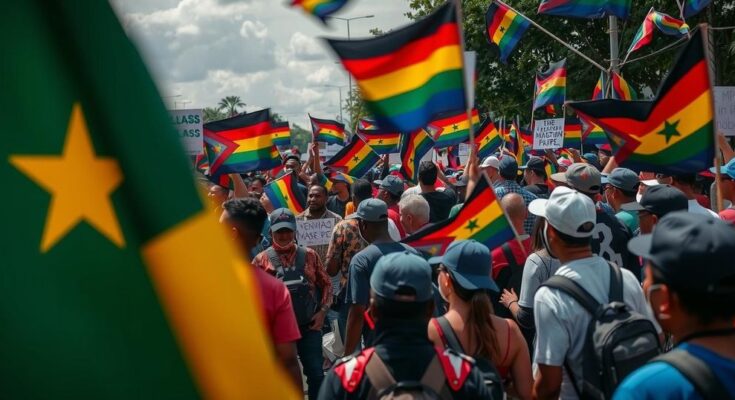Following Mozambique’s controversial elections, protests erupted as citizens challenged the ruling Frelimo party’s claims of victory amidst allegations of electoral fraud. Violent confrontations led to the deaths of at least eleven people, including Silvio Jeremias, prompting demands for justice and democratic reforms from a frustrated public. The discontent reflects broader issues of accountability within the political system and a growing yearning for change among the nation’s youth.
On the evening of October 25, Silvio Jeremias was returning home from work in Maputo, Mozambique, when he inadvertently encountered a gathering of protesters reacting to the recently announced election results. The ruling party, Frelimo, claimed its presidential candidate, Daniel Chapo, had secured 70.7% of the votes, which maintained Frelimo’s dominance since Mozambique’s independence in 1975. However, allegations of electoral manipulation and rigging were rampant. Tragically, during the protest, police confronted demonstrators with live ammunition, resulting in Jeremias’ untimely death. His friend, Carmelita Chissico, expressed profound shock, stating, “This situation was a total shock for us. He was still very young.” Jeremias is among at least eleven individuals reportedly killed by security forces during protests across the nation, with around fifty others sustaining significant injuries, according to Human Rights Watch. Law enforcement officials contended that they discharged live ammunition only into the air to disperse the crowd. Angela Uaela, a police spokesperson, indicated that a single woman was reportedly killed and five others injured due to “stray bullets” during a confrontation involving opposition supporters attempting to seize a firearm from police. Mozambique remains one of the globe’s most impoverished nations, with an average population age of less than eighteen. This demographic shift is contributing to a growing discontent with the Frelimo party’s long-standing rule. The principal opposition, Podemos, led by Venâncio Mondlane—a former forestry engineer and banker—gained significant traction among younger voters. Podemos has asserted it achieved 53% of the electoral vote and secured 138 parliamentary seats, which contrasts sharply with official counts that attributed Frelimo 195 seats, an increase of eleven. Preceding the election, civil society groups voiced allegations of nearly 900,000 fraudulent voter registrations from an electorate of approximately 17 million. Simultaneously, the country’s Catholic bishops claimed instances of ballot tampering. The European Union’s election observers commented on the mishandling of vote counts and the unsubstantiated modification of results. As calls of electoral corruption echoed, two prominent figures affiliated with Podemos, lawyer Elvino Dias and filmmaker Paulo Guambe, were tragically gunned down by unidentified assailants on October 19. Such occurrences align with a concerning trend of violence against opposition members, where unaccountability reigns in the face of numerous killings of politicians, journalists, and activists. Hilário Lole, spokesperson for the National Criminal Investigation Service, stated that it would be “premature to say whether or not there are any clues” regarding the perpetrators. António Niquice, a Frelimo central committee member, expressed dismay over these killings, urging the judiciary to pursue justice. Additionally, in a separate incident, plainclothes officers allegedly targeted Mondlane with gunfire during a press conference, further highlighting the volatile political climate. Amade Ali, who served as Mondlane’s bodyguard, recounted, “They started firing real bullets directly at… Venâncio.” The mourning for Jeremias has evolved into fervent demands for political reform and accountability. At a recent memorial service, mourners donned white shirts emblazoned with his image and invoked chants for justice and democratic values. Visuals from local broadcaster STV captured two young women holding placards reading, “You can kill me but don’t kill democracy.”
Mozambique has been grappling with political unrest, particularly surrounding recent elections that saw the ruling Frelimo party claim victory amid widespread allegations of electoral fraud. The country suffers from extreme poverty, exacerbated by a disillusioned youth population increasingly critical of the longstanding governance methods employed by Frelimo, which has maintained power since independence. The explicit violence during protests reflects deeper societal grievances and a yearning for transparency and legitimacy in the electoral process, particularly as opposition parties like Podemos challenge the status quo. Revelations of potential electoral malpractice have incited significant public outcry, and tragic incidents involving the deaths of political figures underscore a pattern of violence against dissenting voices in Mozambique’s political landscape.
The tragic events following Mozambique’s recent elections illuminated the rising tensions between a disillusioned populace and the ruling regime. The state violence reflected in the protests indicates a critical juncture in the nation’s political discourse, with calls for accountability and justice gaining momentum among the younger generation. The deaths of activists and the persistent allegations against the ruling party highlight the urgent need for electoral reform and protection for opposition voices. As the nation mourns Silvio Jeremias, the collective demand for democracy and fundamental rights surfaces, demanding attention and consideration from both national authorities and the global community.
Original Source: www.theguardian.com




